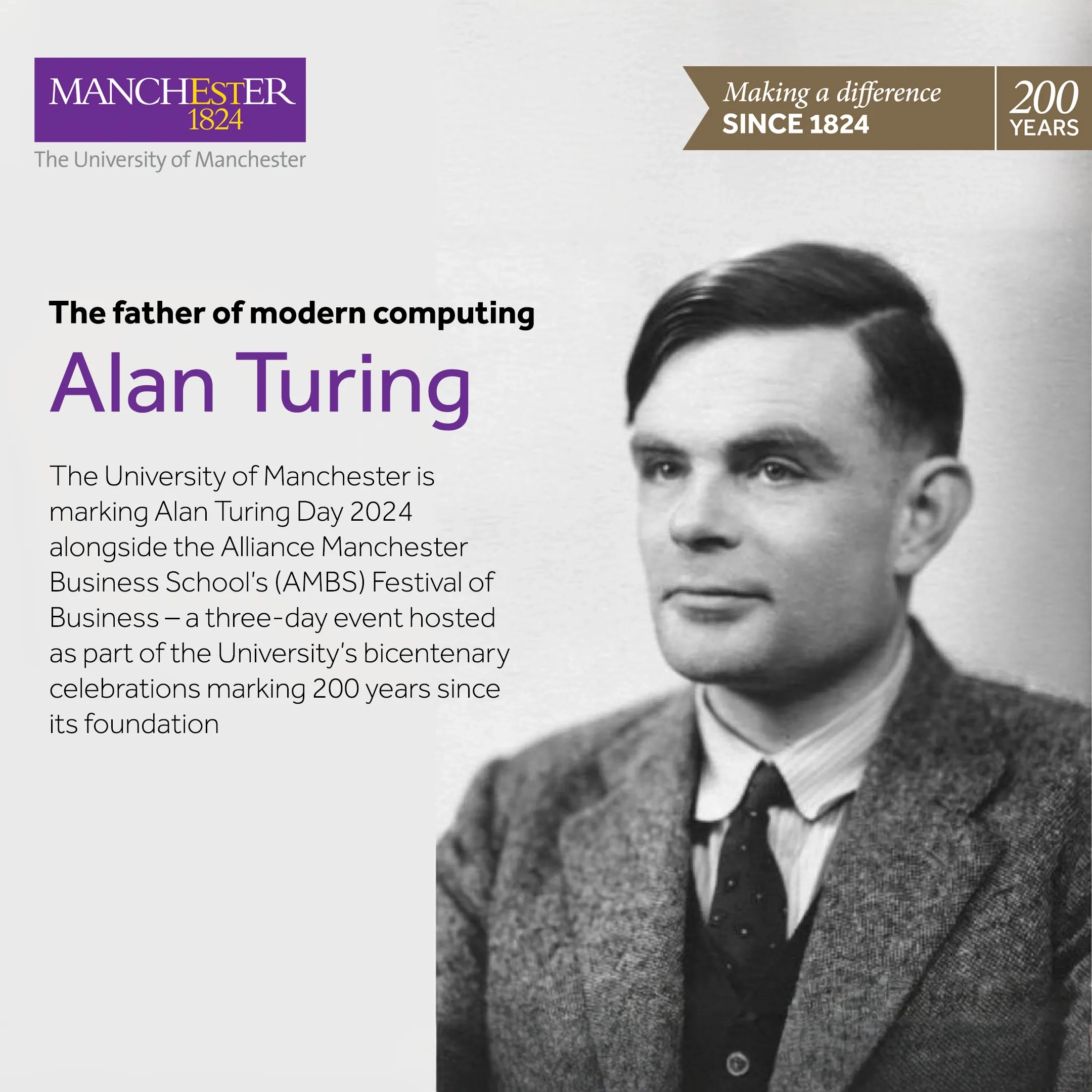
The University of Manchester celebrates the ‘father’ of modern computing and artificial intelligence
AI moves closer to passing the ‘Turing Test’ as demand for new AI teaching programmes soars amid growing digital skills gap
The UAE is a leader in AI with the world’s first Minister for AI, a National Strategy for AI 2031, and a new group of Chief AI Officers is set to drive adoption across government agencies in Dubai. As AI becomes ubiquitous, people are increasingly asking whether it is truly ‘intelligent’.
The most famous benchmark test of artificial intelligence – whether a machine can think - is known as the ‘Turing Test’ (originally called the imitation game) developed by Professor Alan Turing in 1950 at The University of Manchester.
Alan Mathison Turing (1912–1954) was a mathematician, computer scientist and codebreaker and is often described as ‘the father of modern computing’. He influenced the development of theoretical computer science, for which he provided a formalisation of algorithms and computation with the idea of a universal computer, known as a ‘Turing Machine.’
Turing was based at The University of Manchester following his work with the British Intelligence Service at Bletchley Park during World War II. His contribution led to the breaking of the German Enigma machine codes, an achievement that sees him featured on the UK £50 note. He was also featured in the film ‘The Imitation Game’ in which Turing was portrayed by actor, Benedict Cumberbatch (a University alumnus).
The University is marking Alan Turing Day 2024 alongside the Alliance Manchester Business School’s (AMBS) Festival of Business – a three-day event hosted as part of the University’s bicentenary celebrations marking 200 years since its foundation.
AI may pass the Turing Test but trust issues remain
Turing stated that if an AI system can fool a human being for long enough, it passes the Turing Test and we can consider it to be generally intelligent – this is the core of the definition of AI. The recent success of ChatGPT and other large language models (LLMs) raises questions about this test - they look very intelligent to the uninitiated observer and some of the LLMs may be able to pass the Turing Test.
In a recent masterclass at the University’s Middle East Centre in Dubai, Alliance Manchester Business School (AMBS) faculty discussed the future of AI and considered the potential for AI to operate as a decision support advisor to humans. However, there are still risks associated with AI, including bias, lack of transparency, worker displacement, and increased inequality – and the importance of AI governance and the need for regulations to ensure the responsible use of AI. Current AMBS research initiatives on AI include projects on trust in driverless cars, assistive AI for services, and security of AI software.
Investing in AI and trust capability
In May 2024, the University’s Faculty of Humanities received a multimillion pound award to enhance its research and teaching capabilities in the critical areas of AI, trust and society. The investment will support an interdisciplinary research cluster with the Centre for Digital Trust and Society (CDTS) at the University. The investment will also support further research and industry funding, and help develop new teaching and executive education programmes, enhancing the University’s capability in ethical and responsible AI.
In the UK, demand for new teaching programmes in the area of AI is soaring. Recent data (for April 2020-March 2023 from the Office for Students’ AI and data science postgraduate conversion funding) shows 7,600 students have enrolled on AI and data science postgraduate conversion courses across the UK, helping to address a critical digital skills gap in the AI and data science industries.
Richard Allmendinger, Professor of Applied Artificial Intelligence at Alliance Manchester Business School and Faculty Associate Dean for Business Engagement, Civic and Cultural Partnerships: “The demand from industry is clear. International partners wish to collaborate on issues of AI governance and responsible AI, as do various strategic partners. As a city-region, Manchester also has the largest AI innovation cluster by number of jobs outside London.”
The University of Manchester is a member of the prestigious Russell Group and is one of the UK’s largest single-site universities with more than 44,000 students on campus – including more than 10,000 international students. The University is consistently ranked among the world’s elite institutions for graduate employability and world-class research across a diverse range of fields including cancer, advanced materials, global inequalities, energy and industrial biotechnology. 25 Nobel laureates have either worked or studied at the University, which is the only UK University to have social responsibility among its core strategic objectives, dedicated to making a positive difference in communities around the world.
